|
 Secure Site
Secure Site
|
 |
Archive for the 'intention' Category
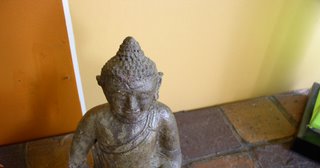 How to meditate Some traditions believe that, to truly practice meditation, you must turn your back on the world: Monks in Thailand live in the woods, hundreds of miles from civilization. Other traditions emphatically state that you must engage in the whole of life, as Buddhist meditation teacher Jack Kornfield attests: “We may start by practicing meditation much like practicing piano. Eventually, when we become proficient, we will not need to practice anymore. Just as playing becomes practice, everything we do will become meditation. In the end, meditation techniques transcend even themselves. Then, there will be neither meditation or non-meditation. Just what is.”
Those disinclined to move into the deep woods, or not far enough along the woodsy path to make every moment a meditation, can create a proscribed area for meditation. While doing this, pay attention to Zen Master Shunryu Suzuki’s advice in his classic treatise, Zen Mind, Beginner’s Mind (Weatherill, 1990): Try to see the space without preconceptions or expectations. As Suzuki puts it,”In the beginner’s mind, there are many possibilities; in the expert’s mind, there are few.” Keep it simple, and make it real.
Our Zen Timepiece’s acoustic 6-inch brass bowl-gong clock is the world’s ultimate alarm clock, practice timer, and “mindfulness bell.”
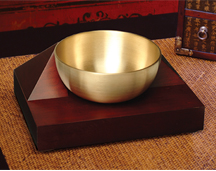 Meditation Timers and Alarm Clocks for a Peaceful End to Your Mindfulness Practice It fills your environment with beautifully complex tones whenever it strikes. It’s exquisite sounds summon your consciousness into awakening with a series of subtle gongs that provide an elegant beginning to your day. Once you experience the Zen Timepiece’s progressive awakening, you’ll never want to wake up any other way.
Our Singing Bowl Meditation Timer also serves as a countdown and interval timer for yoga, meditation, bodywork, etc.; and it can also be set to chime on the hour as a tool for “mindfulness.”
adapted from Natural Home Magazine, November/December 2000 by Kelly Smith
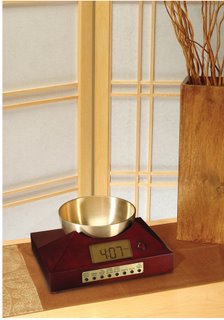 Singing Bowl Meditation Timer from Now & Zen, Inc. - Boulder, CO Now & Zen’s Meditation Timer & Alarm Clock Store
1638 Pearl Street
Boulder, CO 80302
(800) 779-6383
Posted in intention, Meditation Timers, Meditation Tools, mindfulness practice, Zen Timers
 walking in waves, a mindfulness meditation There is nothing more soul-renewing than a very long, meandering, aimless walk. And I do mean aimless — as in, “I’m heading out! I have no idea how long I’ll be or where I’m going!”
I started walking this way quite by accident, in the midst of recovering from the heartache and confusion of losing my job. I had been slothful through winter, alternating between insomnia and sleeps so deep I wasn’t sure what day it was when I woke. But with the changing light of spring, I was beckoned out of doors.
Finding Peace Amidst the Chaos
I was in Manhattan, and cities are excellent places for meditative walks. They’re full of interruptions and distractions, but there is always a bus stop or a person with directions within easy distance. So you can suspend the anxiety about getting lost or getting home.
And all that noise does for humans what shape does for bats: Even if we aren’t tuning into it, it guides our steps and signals danger or direction.
A city walk also delivers the pleasure of unexpected architectural discoveries: trolls clinging to the corners of buildings, swags of flowers carved into stone friezes.
These days I’m walking in the country, in coastal Rhode Island, where the blackbirds and foxes keep me company.
“Exploring the world is one of the best ways of exploring the mind,” writes Rebecca Solnit in “Wanderlust: A History of Walking.” The mind eventually begins to follow the feet, and a logjam of anxiety starts to come loose.
 Soul-Renewing Walking Meditation From Type A to Point Be
Long walks are the cure for writer’s block, lover’s block, mother’s block, friendship block, and any other kind of obstacle that we try to deliberately gnaw our way through, worrying over the problem and getting nowhere.
Better to let yourself really go nowhere and experience the delicious paradox of losing yourself to find yourself.
Walking with indirection has, at heart, a paradoxical benefit. When you stop making decisions for a little while, before you know it, you are filled with purpose, and the goals and paths of your life take on a new clarity.
It is by such grace that life unfolds; how lovely to suspend disbelief (I will never feel good again) and arrive at conviction: Life is wonderful! What a joy to be moving!
How-To: Walking as Meditation
1. Focus on your breathing. Paul Smith, walking-meditation instructor at Lake Austin Spa Resort in Austin, Texas, recommends inhaling slowly through your nose for 4 steps, keeping your breath in for 2 steps, exhaling for 4 steps, then waiting 2 steps before inhaling again.
2. Gently corral your wandering mind. Try repeating an affirmation in time with your breathing and steps. Smith recommends phrases such as “My life is a pleasure,” “I speak the truth and listen without judging,” or “I see all things in clarity.” Another trick: Visualize putting your worrisome thoughts in a balloon and letting go of the string.
3. Hold one hand behind your back. This will help slow you down. “Don’t let yourself get into race-walking mode,” Smith says.
4. Pay attention to your senses. Focus on vision first, which is easiest. Notice a plane overhead, leaves in the trees. Then notice sounds around you, the sun on your face, the smell of cut grass. Smith says, “These are ways to stay in the present.”
5. On a practical note: If you’re walking for distance, carry a little “mad money” in case you tucker out miles away. But no cell phone — or turn it off if you must have it on you.
adapted from Wholeliving.com, September 2010 by Dominique Browning
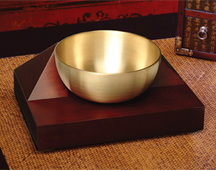 Singing Bowl Meditation Timer & Alarm Clock
Our Zen Timepiece’s – (a Singing Bowl Meditation Timer) acoustic 6-inch brass bowl-gong clock is the world’s ultimate alarm clock, practice timer, and “mindfulness bell.”
 Hokusai Wave Zen Meditation Timer and Alarm Clock Now & Zen – The Meditation Timer Store
1638 Pearl Street
Boulder, CO 80302
(800) 779-6383
Posted in Chime Alarm Clocks, Hokusai Wave, intention, Japanese Inspired Zen Clocks, Meditation Timers, Meditation Tools, mindfulness practice, nature, Walking Meditation, Well-being, Zen Timers
 Instant Calm You’re cut off while driving. Your children erupt into a screaming fight. Or you’re five minutes away from an interview for the job of your dreams and your composure evaporates in a rush of anxiety. When life delivers adversity, stress is the common response. Your body kicks into action, preparing for a fight. The adrenal glands pump out adrenaline and noradrenaline — hormones that increase the heart rate, quicken breathing, raise blood pressure, and tense muscles. You’re ready to take on the perceived threat to your safety or well-being.
Of course, in reality we rarely run from foes or physically challenge them. As a result, we don’t burn off these powerful hormones, leaving them to “course through our bloodstream,” explains Dr. Herbert Benson, a pioneer in stress research at Harvard Medical School’s Mind/Body Medical Institute. In the short term, a pounding heart and sweaty palms can exacerbate the stressful emotions you’re already feeling. Left unchecked, this chemical mix sets you up for an array of physical and emotional problems, says Benson, including anxiety, depression, and intensified PMS and menopause symptoms.
The next time you are facing a stressful situation, stop yourself from spiraling out of control and bring yourself back to center.
Here is one exercise:
During a stressful event, your thoughts can intensify the storm inside of you. For example, say you’re about to give an important presentation to a large audience. You might find yourself worrying that you’ll get the facts wrong. This kind of worst-case-scenario thinking can increase the rush of stress hormones, worsening your prespeech jitters.
A technique known as “thought-stopping” can help you halt these negative, obsessive thoughts, says Dr. Kenneth Ruggiero, assistant professor in the department of psychiatry and behavioral sciences at the Medical University of South Carolina in Charleston. The first step, he says, is to literally call a halt to this train of thought. If you’re alone, say the word “Stop!” out loud. If you’re around others, think it to yourself. Some people even find it useful to pinch themselves to disrupt those stressful thoughts, says Ruggiero. “This gives you a moment of distraction,” he says, “and an opportunity to change your focus.”
Next, choose a positive thought on which you’ll focus instead, such as “I’ve given presentations before, and they went well” or “I know this material better than anyone in the audience.” In doing so, says Ruggiero, you swap a negative, stress-inducing thought for a positive one.
adapted from Body + Soul Magazine, 2010 by Erin O’Donnell
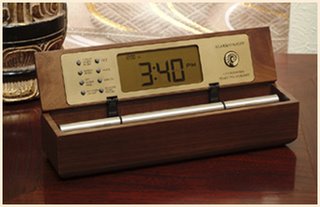 Walnut Wood Meditation Timers with Chime Now & Zen – The Zen Alarm Clock Store Headquarters
1638 Pearl Street
Boulder, CO 80302
(800) 779-6383
Posted in intention, mindfulness practice, Well-being
 meditation mindfulness It may start in your head, but it’s often your body that bears the brunt of chronic stress. A likely risk factor for heart disease and cancer — the two leading causes of death in the United States — chronic stress has also been linked to insomnia, migraines, lowered immunity, increased abdominal fat, and digestive problems.
Although it might not seem as dire a problem as smoking or a decades-long fast-food habit, chronic stress may be every bit as damaging. Scientists aren’t clear how it contributes to illness, but there are likely both behavioral and physiological factors at work. When you’re under stress, you’re less likely to eat well or exercise, but evidence also suggests that the release of stress hormones could promote low-level inflammation (an effect that may, in turn, contribute to a host of ailments and chronic illnesses).
Reducing stress, then, is an absolute must for good health. But rather than rely on the annual vacation to melt away tension, build in daily prevention. “Our bodies and minds are shrieking for us to take better care of ourselves,” says Alice Domar, Ph.D., founder of the Domar Center for Mind/Body Health in Waltham, Massachusetts.
One Solution: Meditation
Meditation
Everybody needs a sanctuary, a place to rest and renew. The beauty of meditation — a proven and profound form of self-care for mind and body — is that almost anytime, anywhere, you can access that place of restorative calm.
Yet for some, meditation sounds mysterious or intimidating, probably because of some common misconceptions: that it’s dry or boring or “too spiritual”; that it’s an esoteric practice for those operating on some higher, more rarefied plane.
Yes, meditation is an ancient spiritual practice — one that cuts across different religions and many different traditions. But what it boils down to — however it’s practiced and whatever form it takes — is this: To meditate simply means to rest in moments of appreciative, exquisite attentiveness. Moments that allow us to savor the experience of living and that make us feel both deeply calm and deeply alert, in tune both with our self and with the world around us. Moments we come away from feeling refreshed, renewed, and engaged. Meditation is a way of communing with spirit.
We all know how to meditate; it’s an instinctive ability. If you’ve ever been deliciously absorbed gazing at the flow of a river, the dance of a fire, or the twinkle of stars, you’ve enjoyed meditative moments. And you can create those moments almost anywhere at any time. If you have a favorite place in your home in which to meditate, that’s wonderful. But you can meditate just as effectively sitting at your desk or on a park bench, or lying in the grass. The fact is, the juicier and more sensual you let meditation be, the more you will get out of it.
Meditating on a daily basis is easy. Give yourself a space of time — 10 to 20 minutes morning and afternoon, or if that’s not possible, a few minutes here and there throughout the day. Choose a pleasing, peaceful focus for attention — sensations, such as the flow of your breath; a sound you make, such as ahhh; or a visual image, such as waves coming to shore. This is your home base. Lightly focus your attention, and when your mind wanders off, gently come back to home base. Minds wander — a lot. So go easy on yourself and accept the process. Set your Meditation Chime Timer (Now & Zen, $199.95) for 20 minutes. When you hear the gentle chime, slowly open your eyes.
Our Meditation Chime Clock’s long-resonating Tibetan bell-like chime makes waking up and meditating a beautiful experience – its progressive chimes begin your day with grace.
 Meditation Chime Timer by Now & Zen, Inc. - Boulder, CO Those are the basics, but there is no one right way to meditate; explore what works for you. These two simple meditations will help you get started.
Meditation One: Sensuousness of Breath
Time: 5 to 10 minutes.
When and Where: Anytime, anywhere.
Position: Sitting comfortably or lying down, eyes open or closed.
Intention: I bask in healing pleasure. I receive the nourishment into every cell of my body.
One of the most universal meditation practices is to take pleasure in the flow and rhythm of breath. Buddha described this as “breathing in and out sensitive to rapture.”
1. Breathe out with a deep sigh a few times and notice what that feels like. Let yourself make quiet whooshing sounds. If you feel a stretch or a yawn coming on, give in to it. Gently ask yourself, “What pleasure do I feel in breathing?”
2. Explore the sensations that accompany breathing — the feeling of the chest expanding and contracting, the gentle touch of the air gliding through the nose and down the throat, filling and then emptying the lungs. How luscious can you let breathing be? Perhaps you enjoy the relaxing ebb and flow of the breath, or love breathing’s whispering sounds. If you’re outside, you might savor the fragrance of grass, trees, or flowers as you inhale. You might feel simple wonder at receiving this essential gift from life.
3. Breathe with this type of awareness for 10 minutes or so, allowing your attention to be soft and undemanding, like rose petals on your skin. Thoughts and feelings about your life will come into your awareness; this is healthy and healing, so don’t try to block them out. Just keep coming back, gently, to the sensuousness of breath when you can.
 Singing Bowl Meditation Timer by Now & Zen, Inc. Meditation Two: Heart Warming
Time: 5 to 20 minutes.
When and Where: Anytime, although the end of the day is nice. Try to find a cozy place.
Position: Sitting comfortably or lying down, eyes open or closed.
Intention: I am awake to love. I am ready to give and receive.
In this meditation you give yourself time to feel the emotional impact of all that is in your heart. Be leisurely, and linger in any of the meditation’s phases for as long as you like.
1. Begin by thinking of someone or something you love without reservation. Notice the sensations that arise in your heart and let yourself be with whatever is there — warmth, aching, joy, longing.
2. Bring both hands to your heart, feeling the warm contact of your palms against your chest. Imagine your heart being warmed by your love, melting any cold places, any part of you that is afraid, grieving, or lonely.
3. Make a humming sound, such as ahhh or ohhmm. Enjoy the way the sound vibrates in your chest for as long as you like. Then gradually let the sound fade away; you can return to it at any time.
4. Again notice the contact of your hands on your heart. Slowly open your arms outward, as you would to embrace someone. Take a few breaths and then slowly bring your hands back to your chest. Repeat this movement several times with great leisure. The simple motion of opening to give and drawing in to receive is a yoga of the heart, a way of expressing balance. End by bringing your hands back to your heart; pause, savoring the sensations and feelings.
Benefits of Meditation
– Promotes relaxation
– Enhances health
– Cultivates vitality
– Fosters clarity
– Increases focus
– Reduces stress
adapted from Body + Soul, April 2008 & June 2005 by Lorin Roche
 Chime Wake Up Clock by Now & Zen
Now & Zen’s Meditation Chime Timer Store
1638 Pearl Street
Boulder, CO 80302
(800 779-6383
Posted in intention
 How to Create Instant Calm A healing art based in traditional Chinese medicine, acupressure involves pressing specific points on your body to release muscle tension and stimulate circulation and the flow of qi, or life energy. Two points on the back of your neck known as the “gates of the mind” can ease stress and clear your mind, says Dr. Michael Reed Gach, founder of the Acupressure Institute in Berkeley, California, and producer of the guided self-care DVD “Acupressure for Stress Relief.” As an added bonus, he adds, pressing these points can stop headaches from developing.
Tilt your head back and place your thumbs at the top of your neck, just below the base of your skull, about three inches apart. Press these spots firmly but gently. “You don’t want to press on the skull, but just underneath it,” Gach says. “If your thumbs are weak or arthritic, use your knuckles instead.” As you press, take three to five slow, deep breaths. Finish by letting your hands float into your lap and your chin drop to your chest. Take an additional deep breath, and briefly scan your body to see how you feel. You can repeat this three times, set your Zen Chime Timer so that it repeats every ten seconds so that you can time your breathing.
adapted from Body + Soul July/August 2006
 wake up alarm clocks with chimes Now & Zen’s Chime Meditation Timer Store
1638 Pearl Street
Boulder, CO 80302
(800) 779-6383
Posted in intention, mindfulness practice, Now & Zen Alarm Clocks, wake up alarm clock, Well-being
Stillness at Start and End of Day
 The best stress remedy is to do nothing, use a chime timer for a gentle reminder If checking your email has become as vital to your wake-up and bedtime routines as brushing your teeth, it’s time to unplug.
“Starting and ending the day in stillness is essential to stress reduction, so it’s absolutely critical not to jump into email during either of those times,” say”
In the morning and at night, turn off your computer (and TV) and pick up a book — or simply delight in the rare pleasure of doing nothing suggests Joan Borysenko, Ph.D., author of “Your Soul’s Compass.
A little nature therapy can also ease the stress of too much computer time. A stroll through a park or on a trail counteracts overstimulation and can also boost your mood and energy.
Our Digital Chime Zen Clock & Timer’s long-resonating Tibetan bell-like chime makes waking up and meditating a beautiful experience – its progressive chimes begin your day with grace.
adapted from Body + Soul Magazine, 2010
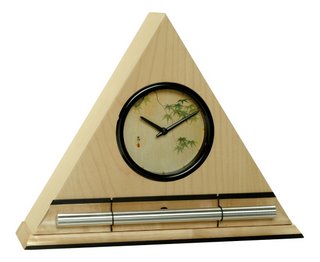 Zen Alarm Clock in Maple Finish, Japanese Leaves Dial Face and Stillness
Now & Zen’s Chime Timer Store
1638 Pearl Street
Boulder, CO 80302
(800) 779-6383
Posted in Chime Alarm Clocks, intention, mindfulness practice
 A Stillness Practice for before Bedtime Tailgaters. Telemarketers. Teenagers. When you can sum up your day that way, it’s easy to respond with a few choice words of your own. Yet losing your cool rarely feels good or reflects your best character. To maintain your center and stay true to yourself, try this technique from David Simon, M.D., medical director and co-founder of the Chopra Center for Well-Being in Carlsbad, Calif.
Every night before bed, take a few minutes to mentally replay your day. This simple process gives you a different perspective on your actions, along with the opportunity to right any wrongs.
* Set your Zen Timer with Chime for 5 to 10 minutes. Sit up in bed with a pillow propped behind you; bend your knees or cross your legs comfortably on the bed.
* Close your eyes and take a few slow, deep breaths. Observing the in-and-out flow of your breath, allow your body to relax and your mind to quiet.
* Let the day’s events unfold. Picture each one from the time you awoke to the present.
* Notice if your body reacts negatively during any part of the process. A churning in your gut or a nervous response may signal something unresolved.
* Reflect on this particular event and ask yourself if you acted correctly. If anything feels unsettled, note it in a journal with the intention of addressing it the next day.
Revisiting unresolved issues offers you a second chance to do the right thing, Simon says. Maybe a disparaging remark was said about someone you like and respect, but you didn’t speak up at the time. Now you can tell the person who made the remark why such talk makes you uncomfortable.
Over time, annoyances like traffic jams will seem less significant and stressful. “You’ll be able to stay centered and balanced as you encounter the ups and downs of life,” Simon observes. Even better, this nightly evaluation will make you more aware of your goals and how they relate to day-to-day activities. “It will help you honor the person you want to be in the world,” he says.
adapted from Natural Health Magazine by Sarah D. Smith
The Zen Timer & Alarm Clock with Chime serves as a countdown and interval timer for yoga, meditation, bodywork, etc.; and it can also be set to chime on the hour as a tool for “mindfulness.”
 Natural Wood Chime Zen Timers and Alarm Clocks Now & Zen’s Chime Alarm Clock Shop
1638 Pearl Street
Boulder, CO 80302
(800) 779-6386
Posted in intention, Meditation Timers, Meditation Tools, mindfulness practice, sleep, Well-being, Zen Timers
 wake up and do something How to Fight the Urge to Sleep Too Much
Not getting enough sleep can sometimes be a bad thing. But did you know that getting too much sleep is just as bad?
One Solution: Wake up and do something. Once you’ve done your routine, get moving. Walk to work, or if you drive, park a bit out and take the stairs up. On the weekend, you can go for a walk or vacuum. Whatever you do, get your blood moving. It’ll let you clear mental cobwebs left by sleep and settle into wakefulness.
Boulder, Colorado—an innovative company has taken one of life’s most unpleasant experiences (being startled awake by your alarm clock early Monday morning), and transformed it into something to actually look forward to. “The Zen Alarm Clock,” uses soothing acoustic chimes that awaken users gently and gradually, making waking up a real pleasure. Rather than an artificial recorded sound played through a speaker, the Zen Clock features an alloy chime bar similar to a wind chime. When the clock’s alarm is triggered, its chime produces a long-resonating, beautiful acoustic tone reminiscent of a temple gong. Then, as the ring tone gradually fades away, the clock remains silent until it automatically strikes again three minutes later. The frequency of the chime strikes gradually increase over ten-minutes, eventually striking every five seconds, so they are guaranteed to wake up even the heaviest sleeper. This gentle, ten-minute “progressive awakening” leaves users feeling less groggy, and even helps with dream recall.
What makes this gentle awakening experience so exquisite is the sound of the natural acoustic chime, which has been tuned to produce the same tones as the tuning forks used by musical therapists. According to the product’s inventor, Steve McIntosh, “once you experience this way of being gradually awakened with beautiful acoustic tones, no other alarm clock will ever do.”
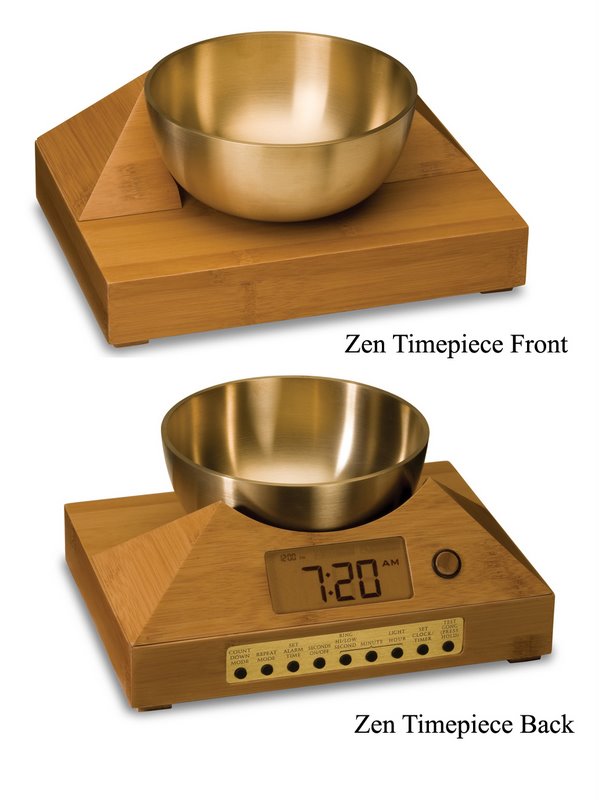 Zen Clocks will Peacefully Help You Awake Shop our Zen Clock Store
Now & Zen, Inc.
1638 Pearl Street
Boulder, CO 80302
(800) 779-6383
Posted in intention, Natural Awakening, sleep, Sleep Habits
 Meditation Problem: You are Tired All the Time
Culprit: Your Adrenal Glands
They’re responsible for secreting the fight-or-flight hormones adrenaline and cortisol, which surge as a response to stress—whether the prehistoric-days type, like being chased by a tiger, or the modern-day version, like financial worries or your mother-in-law. But when you’re feeling stressed all the time, those glands may become overworked and can tire out—a condition commonly called adrenal fatigue, says Keenan. The inability to secrete enough cortisol during the day can cause energy dips, then spikes at night that can interfere with restful sleep.
To give your adrenal glands a chance to recharge, Keenan recommends meditation, which she thinks of as parking the body in neutral. “Meditation has the effect of slowing down the production of cortisol for a while,” she says. Try sitting quietly and clearing your mind. Set your Zen Clock for at least five minutes a day and increase until you are able to sit comfortably for 20 minutes each day. Vitamins B5 and C have also been shown to support adrenal function, says Jacob Teitelbaum, the Kona, Hawaii–based medical director of the Fibromyalgia & Fatigue Centers and the author of From Fatigued to Fantastic!. He recommends getting at least 50 milligrams of B5 and 500 milligrams of C daily. Other stress-reduction techniques work well, too. “Exercise is particularly effective,” says Park.
adapted from RealSimple.com
 Meditation Tools and Timers by Now & Zen, Inc. Now & Zen Meditation Tool Store
1638 Pearl Street
Boulder, CO 80302
(800) 779-6383
Posted in Chime Alarm Clocks, intention, Meditation Timers, Meditation Tools, mindfulness practice
 it's okay to yawn Afraid to risk rudeness and let out a hearty yawn? Well, here’s an excuse to give Miss Manners a hissy fit: According to neuroscientist Andrew Newberg, MD, director of the Center for Spirituality and the Mind at the University of Pennsylvania, yawning is one of the best-kept health secrets. “If you want to maintain an optimum healthy brain, it is essential that you yawn,” says Newberg. The action stimulates neural movement in certain areas of the mind and regulates brain temperature and metabolism—all of which can increase muscle control, enhance sensuality, and even ward off jet lag. Newberg suggests yawning 10 times in a row every day, along with your regular workout or wellness routine. A nightly yawning ritual can help you:
Chill out. Newberg says a good yawn can relax you more effectively than meditation. “More than simply calming the body, yawning brings the mind into a heightened state of cognitive functioning.”
Stay focused. “Yawning rids the brain of sleepiness, helping you keep your attention on important ideas and concepts,” says Newberg. So why do we start yawning before we hit the sack? Because it also helps regulate our internal clock: When we’re tired, yawning signals sleep. No need to set your Zen Alarm Clock for bedtime quite yet.
Be more compassionate. Studies show yawning stimulates the part of the brain responsible for generating empathy and social awareness. So intentional yawning may actually strengthen our ability to be kind to others.
adapted from Natural Solutions Magazine, October 2009 by Danielle Winston
 Digital Zen Alarm Clock Now & Zen
1638 Pearl Street
Boulder, CO 80302
(800) 779-6383
Posted in Beauty, intention, Natural Awakening, Now & Zen Alarm Clocks, Sleep Habits, Well-being
« Previous Page — « Previous Entries
Next Entries » — Next Page »
|
|
|
|